|
|
|
 |
HYDE PARK (AH) |  |
|
Hyde Park 'AH' was a famous satellite station to Cannon Row 'AD' .
|
|
|
|
|
| RIGHT: ENTRANCE TO HYDE PARK POLICE STABLES
|
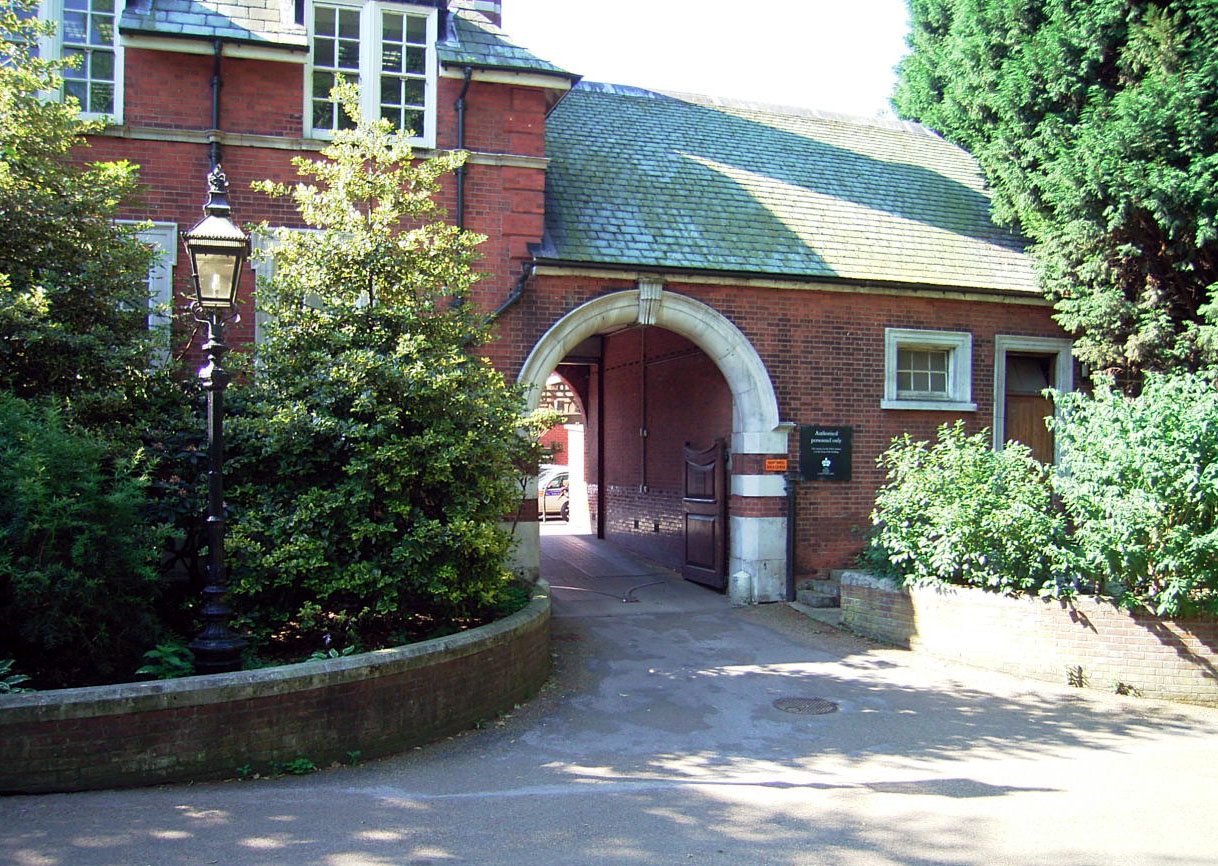 |
|
|
|
| Police Sergeant 50 'A' Edward Owen Attached To 'AH' The memoirs of Sergeant Owen were published in 1904 and covered Sgt. Owen's service at Hyde Park Police Station. He had joined the Met in 1871 and was posted to King Street station and transferred to Hyde Park in 1874 where he was subsequently promoted and stayed until his retirement in May 1896. He must have been a glutton for punishment because on 19th June 1897 he rejoined the job for seven days in order to assist in the Policing of Queen Victoria's Diamond Jubilee. He retained his rank but was not given a divisional number and wore CO on his collar. Sergeant Owen describes numerous winters when the 'frost' completely froze the surface of the Serpentine to a depth of several inches thereby enabling ice skating to take place. During most of the 19th century ice skating was extremely popular and thousands of people took part, not only on the Serpentine, but also on the lakes in St. James' and Regent's Parks. Accidents were not infrequent, Sgt Owen describes the death of a Belgian youth who avoided the Police on duty and skated onto the ice which was only an inch thick, the ice broke and despite all efforts to save him, he drowned. There had been greater tragedies on the lakes during the 19th century, on A massive rescue operation ensued, but by the next day it became clear that forty people had drowned. The skaters had been on the ice opposite Sussex Terrace, the widest and deepest part of the lake. The Police were not the only agency involved in the prevention of accidents King George III donated a farm house situated on the north bank of the Serpentine which became the society's receiving house. The society employed boatmen during the summer and icemen during the winter; they were equipped with all the apparatus needed for rescues. At other Lakes in central London, marquees were erected by The Society to act as receiving houses during the bathing and skating seasons. A model receiving house was built in 1834 on the site of the farmhouse, In 1949 there were approximately 400 receiving stations in the
Are there any readers who remember skating taking place on the Serpentine Leonard Bentley Ex PC 799 'A' email: leonb55@tiscali.co.uk |
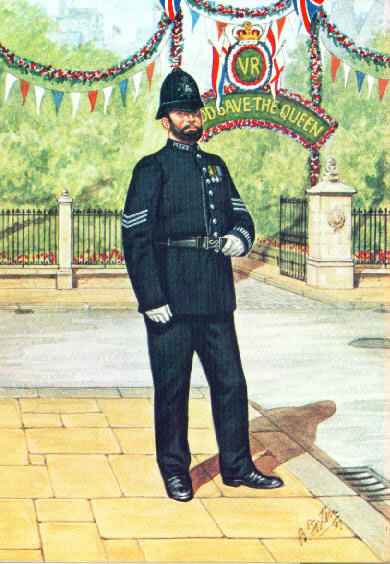 |
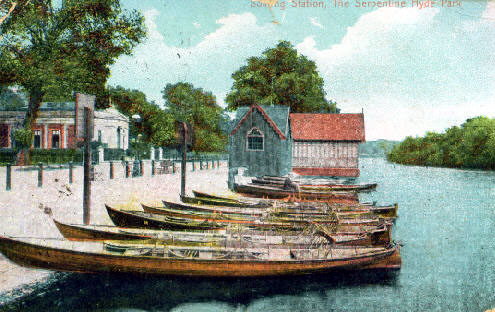 |
ABOVE: A Sergeant of the period LEFT: The Royal Humane Society's Receiving House (rear left) which was removed in 1954 after WW II damage. On the shore of the Serpentine is The RHS Boathouse.
|
| RIGHT: The RHS Boat House as it is today (taken from reverse angle)
|
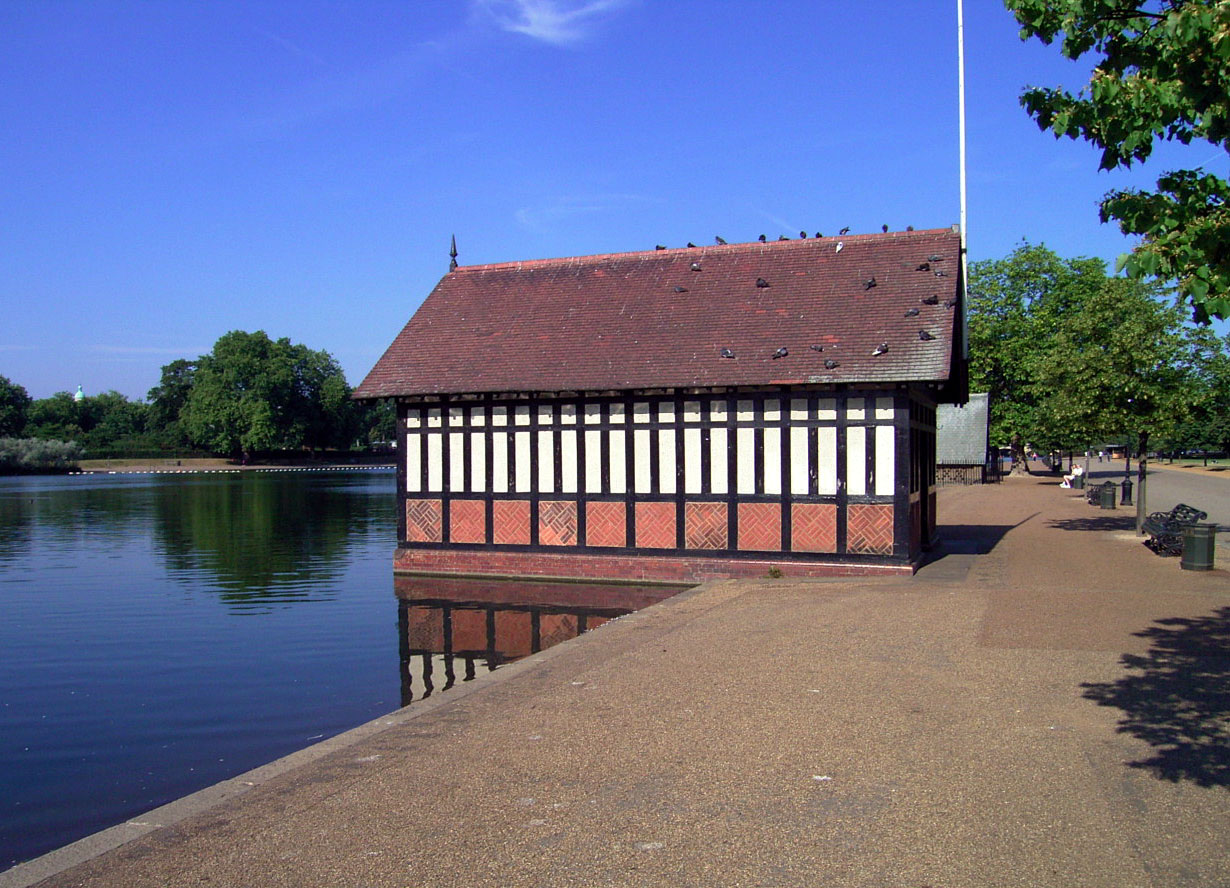 |
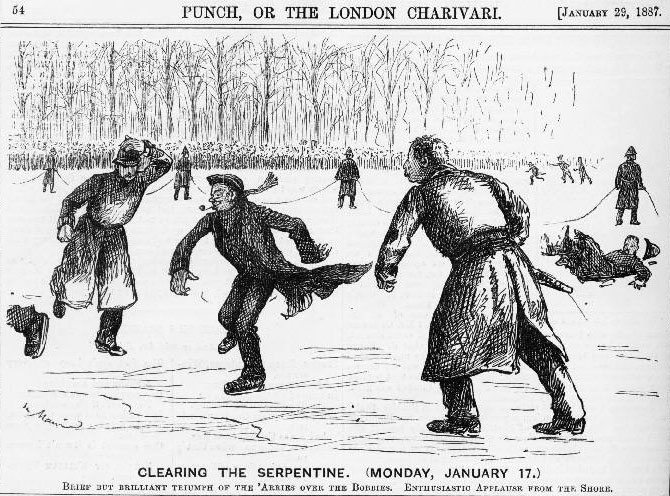 |
'PUNCH' 1887 'Clearing The Serpentine Ice'
|
| 'AH' IN THE THIRTIES. Did you know that we locked up AH (Hyde Park) at night in my day, |
|
| CLICK ON HELMET IMAGE TO RETURN TO 'SIGNPOST' (Express Navigation)
More Tales of AH from Ex PC 154 'A' Terry Brooks Another couple of yarns about Hyde Park of which there are many. PC 323 A Cyril Walker used to service Jock Smith's car and had not thrown the old oil away when he and Jock thought they would have a bit of a lark so they went into the bushes which were in regular use by the Toms, Queers and Jimmers. They knew the trees which the Toms used to lean against and painted up the bark all around the trunk with Jock's old oil. The next late turn they had the night glasses and a coil of wire which after they had seen a few clients of all three denominations, enter the said bushes, Cyril quickly ran around the outer bushes tying the wire at knee height to a bush here and there. Then Jock would say in a loud voice " I've seen them going into these bushes" That caused consternation clients trying to pull up there trousers Jimmers running for dear life along with assorted poofs. Suddenly they hit the wire and went crashing down on to the grass outside the bushes. Jock and Cyril just watched it all. Later that evening one of the Toms was nicked and on getting to the Charge Room said " Cor Blimey look at the state of my F****** Coat"! Walker had the quiet one, but Jack who was strong, had the difficult one, who was struggling. Jack said to his prisoner " I want none of your flaming Whitechapel antics here old son. Turn it in or you'll be off for resisting arrest, as well". This did not have the desired effect, until suddenly he went very quiet. On cross examination, the counsel for the defence, accused Jack of striking his client. Jack denied this. Cyril was then in the witness box and described the act as Cross Hands Boogie. Paul Bennett said "I assume this is another police description of the same action" Quite so Your Worship" said the Clerk. On cross examination the same counsel, asked Cryil if he had seen Jack strike his client Cyril said " No Sir I struck your client, as he was causing my colleague a great deal of difficulty and we were in danger of your client escaping". There you are Mr (I've forgotten the name)said Paul Bennett. You have your answer, though whether it is relevant to the charge before me, I have my doubts". They were of course found Guilty as Charged. So they duly did, rowing as hard as they could. Unfortunately for Jack, he was heading on a collision course, with another much larger boat, in which Jock Smith was sleeping in the stern along with his alarm clock. Jack's skiff went under the bow of Jock's boat, which was well out of the water, due to Jock's great weight. Luckily Jack saw Jock's boat as it happened and managed to leap into Jock's boat via the bow. This now redistributed the weight in Jock's boat, causing it to come down on the skiff, sinking it with out trace. As soon as they had the chance, they told the boat owner and elected to pay for the skiffs recovery. Jacks prospective father in law was a wealthy furniture manufacturer from High Wycombe. I believe he helped out in this matter. Poor old Jock, a heavy sleeper, due to the amount of food he ate and beer he drank, did not awaken until about 6. 30 am. Thank God he had very large hands and was seen rowing back ashore, with only those extremities. It took him quite a while and a deal of explaining to the Duty Officer. Pete Krebs unfortunately has passed on as have many mentioned here. However, I feel sure he will be remembered with affection by any who knew him. He was such a funny man, and a good musician. One evening, I was out with Arthur Titmarsh, also of whom the same sentiments are expressed, along with the ladies, who became our wives. W e happened upon the Gyre & Gymbol, Coffee House, which was in Villiers Street. We went down the basement steps and who should be the cabaret but 140 'A' Roy Stead on the banjo and Pete Krebs on the Guitar, singing folk songs and very good they were too. I'll never forget oy singing " My Baby's Gone Down The Plug Hole" to Pete's accompaniament. Roy still lives in Bahia Grande Mallorca. He unfortunately has a bit of heart trouble, but is in receipt of good care, with Margaret his wife a nurse. Alison his daughter & Miguel his son in law keep us in touch. |
|
|
WPC285AR/1892HOWARD(1961-64)
On leaving training school at Peel House Iwas osted to AR. As a WPC I spent my night duties at AD. In those days women police mainly dealt with women and children so night duty was uually fairly quiet. We used to relieve the WPC on duty in A4 Index in Scotland Yard when she went for refs. It was qite eerie rattling around in there in the middle of the night.My first Christmas on duty fell during the night shift and I seem to recall passing it in a happy state. During the night we would usually go out with the duty officer as he did his rounds of AW an BP. Some nights we would stop cars at random outside St. George's hospital, occasionally getting a result. I used to love London about 5am when the streets had been freshly washed and the only people around were thechars going off to work. The only male officers whose names I recall are PS Garnham and Inspector Wilkinson, who used to have his collection of helmet badges framed in the front office. The WPCs were Sue Chandler and Annette but Ican't remember her surname. Later, when I started courting a fellow officer at AR, I was transferred to AH.Not exactly a hive of industry with highlights being the discovery of a body in the Serpentine, the arrest of a Tom or a lost child. I was the only WPC at AH after the departure of Dilys Puddephat. Ihad hoped to see something from other WPCs while I wandered through your site which I came across by chance. I hope this will be of some use to you. Good Luck. Anne Preston/Ward/Howard |
|
|
|
|
|
|
|
|
|
|
|
|
|